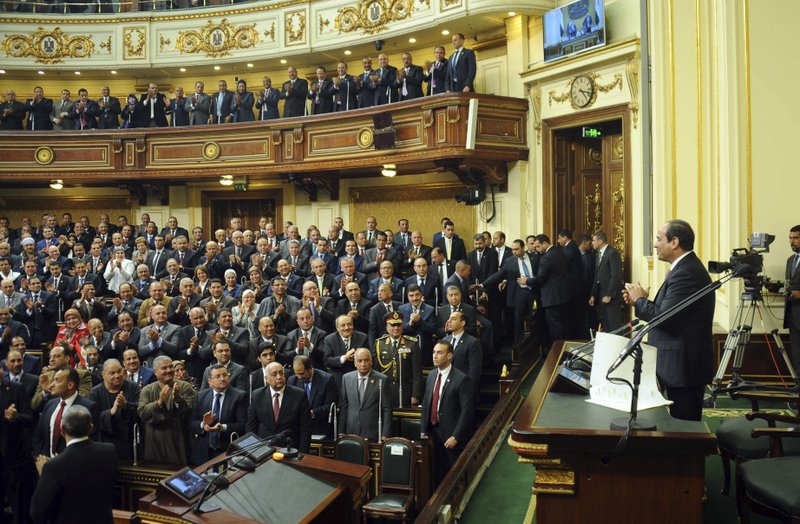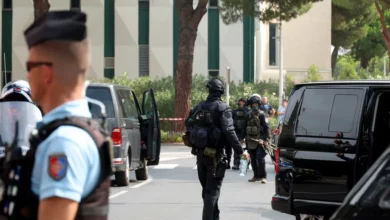
The Egyptian parliament voted in a plenary session on Monday unanimously in favor of new amendments to the 2015 terrorism law, which regulates state-designated terrorist organizations and terrorism lists, and referred the draft law to the State Council for review before the final vote.
The amendments are set to toughen up Law 8/2015 and expand the definition of funding terrorism under the law to include providing space for training one “terrorist” or more and providing them with weapons, documentation, or financial support for travel, according to The Associated Press.
The changes address the money or assets used by “terrorists” and “terrorist groups” and their economic resources, as well as so-called “virtual assets” that can be traded, transferred or used as a payment or as an investment tool by terrorist-designated groups.
The amendments also include life sentences and capital punishment for those accused of funding terrorist-designated groups, according to The Associated Press.
Moreover, the terrorism law amendments stipulate that any person added to the state’s terrorist list will have his membership suspended in professional unions, the boards of directors of companies, and other professional associations and institutions.
The Parliamentary session on the amendments witnessed fierce debate over the first paragraph of article one, which deals with the definition of “terrorist entities” under the law. Discussion revolved around a contentious proposal under the new amendments to include satellite channels and social networking websites in the classification of potential terrorist entities.
The chairman of the Egyptian House of Representatives’ Legislative and Constitutional Affairs Committee, which wrote the draft amendments, was in favor of adding satellite channels and social media sites to the list, while Chairman of Parliament’s Human Rights Committee Alaa Abed objected, receiving some support from Parliament Speaker Ali Abdel-Aal.
Abdel-Aal, for his part, insisted on removing satellite channels and social networking websites from the amendments, arguing that the proposed changes violate Egypt’s Constitution.
“The positives of (removing references to satellite channels and social media sites) outweigh its negatives, and there is no objection to removing this section. We do not want to get into this hassle,” he remarked during the session.
Alaa Abed warned against human rights violations and demanded the House of Representatives take into account Article 51 of the Constitution, which stipulates that “Dignity is the right of every human being and may not be violated. The State shall respect and protect human dignity.”
“This amendment affects human rights,” he said.
The Parliament Speaker responded that he appreciated Alaa Abed’s remarks, but went on to say that the law was temporary and preventative in nature.
“These measures cover a certain period before convicting a person or entity (of ties to a terrorist group), and these measures are being imposed due to the seriousness of the terrorism threat.”
Abdel-Aal argued that the Law, in principle, is in line with “international standards,” saying that court rulings will determine the inclusion of an individual or website in the state list of terrorists and extremist groups, at the request of Egypt’s Public Prosecution.
“The definition of terrorism is clear,” he argued, adding that appeal and legal review remain a possibility.
He said that after the draft is approved by the State Council and returns to the House of Representatives, the body will hold detailed discussions on “every single article,” which he said should make the amendments more clear.
Chairman of the Legislative and Constitutional Affairs Committee Bahaa Eddin Abu Shaqa has said that practical application of the provisions of Law No. 8 of 2015 revealed an “urgent need” for amendments to bolster the state’s ongoing fight against violent extremism.
Authorities have led a crackdown on Muslim Brotherhood members and supporters since former president Mohamed Morsi’s ouster in July 2013. Egypt listed the Brotherhood as a terrorist organization that same year and insists that the group is behind extremist attacks targeting the military and civilians.
Egypt is also battling an extremist insurgency in North Sinai, which is led by a local affiliate of the Islamic State (IS) group. Extremists have targeted military personnel at security checkpoints in the area as well as civilians. Over the weekend, ten militants and an Egyptian army officer were killed in an attack on a security checkpoint in North Sinai, according to a statement issued on Sunday evening by Spokesperson for the Egyptian Armed Forces Colonel Tamer al-Rifaei.
Last week, suspected Islamic militants blew up a natural gas pipeline in North Sinai. Militants have regularly targeted gas pipelines between Egypt, Jordan, and Israel since Egypt’s 2011 uprising, according to a report from The Associated Press.
In January, Egyptian President Abdel Fattah al-Sisi extended the state of emergency an additional three months, citing the “dangerous security conditions which the country is going through.”
The state of emergency was first imposed in April 2017 following the Palm Sunday twin suicide bombings in Alexandria and Tanta that killed over 40 people.
Edited translation from Al-Masry Al-Youm
Image: In this Feb. 13, 2016 file photo provided by Egypt’s state news agency MENA, Egyptian President Abdel Fattah al-Sisi addresses parliament in Cairo, Egypt. On Monday Feb. 10, 2020, the state-run news agency said Egypt’s legislature gave its initial approval for toughening up already “draconian” anti-terrorism laws (MENA via AP, File)




